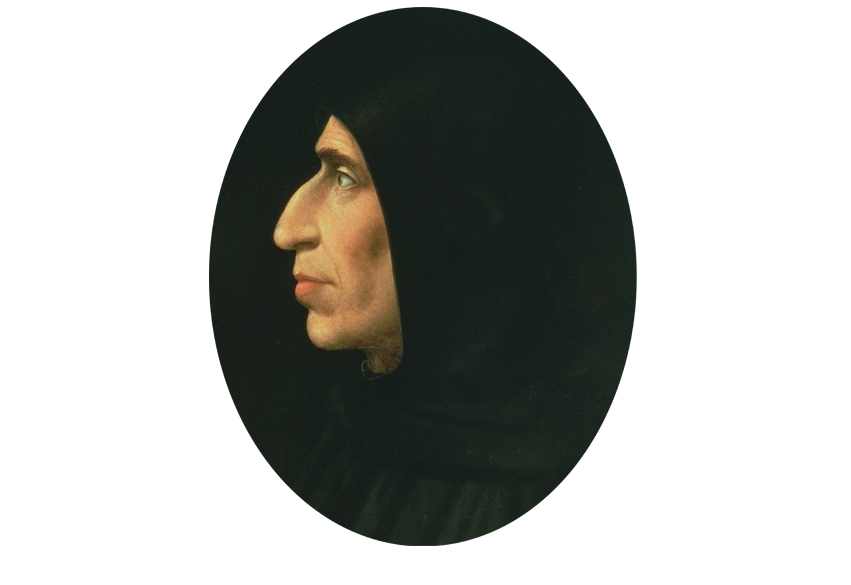The name of Savonarola slides off the tongue as if concocted for an orator’s climax. But when it came to names, whether by melody or reputation, the Florence he knew offered aggressive competition. Pico della Mirandola, Lorenzo ‘il Magnifico’ de’ Medici, Botticelli, Michelangelo and Machiavelli all shared his era.
In an unexpected and sympathetic conclusion to the radical friar’s latest biography, Donald Weinstein defends one of George Eliot’s least loved novels, Romola:
But ‘Savonarolan Florence’, Weinstein contends, has always been a work of fiction, whether woven by the friar, his followers or his detractors. One of Weinstein’s most helpful corrections is banished to a back-note: ‘Savonarola was never master of Florence.’ His biography, then, is more myriad than monolithic. There are intrigues here, character sketches, laws, wars, factions and fashions recorded with particular attention during the four years (1494-8) of Savonarola’s precarious ascendancy in Florence, with that city under the spell of what Weinstein memorably dubs the Frate’s ‘charisma of grace’.Eliot’s success in bridging the 400-year historical and cultural divide between herself and Savonarolan Florence was remarkable, and her judgment of the Frate himself nuanced and independent.
Apparently keeping Eliot’s ‘nuanced and independent’ verdict in mind as a private ideal, Weinstein remains for most of the book discreet to the point of enigma about where he himself stands on his subject. Regarding bias as a mortal sin, Weinstein strives to make every morsel of information about the friar available. The result, rather like the ‘Apuleian feast’ thrown by Lorenzo de’ Medici on St Cosmas’s Day, is various, filling and best digested slowly. But the final course certainly justifies the frustrating profusion of antipasti.
Weinstein’s Savonarola is a consistent, recognisable and tragic character — a talented, if inflexible man, who finds within himself a dangerous power (call it eloquence or ‘prophecy’),which he takes to its extra-logical conclusion; then, after years of Faustian fame, he is forced to renounce it, not merely by the crude expedient of torture on the rope or strappado, but also by a true loss of self-confidence, internal and external. The heroic hysteria of the preacher and the broken indignity of the condemned prisoner, alternately pleading and ‘chuckling’, chime together with pitiful coherence.
In the light of this poignant larger pattern, Weinstein’s urbane tone and his generosity with anecdote and dramatic irony come as a relief. How delightful it is that Savonarola’s ‘New Cyrus’, King Charles VIII of France, died after banging his head on a doorframe the day the Frate was arrested (as the King was a short man, this seems especially fateful); or that the Florentine reconquest of Pisa, promised by Savonarola as part of Florence’s messianic destiny, was, long after the prophet’s execution, effected by the policy of one of his most cynical critics, Machiavelli.
It is by way of this idiom — relaxed, excited sometimes to the point of slanginess and apparently fair-minded — that Weinstein covertly rehabilitates a figure he understands, pities, admires, and even at moments likes. Savonarola’s worst enemies are quoted at their most uncompromising, but their observations are slyly co-opted in his favour. Machiavelli, ‘in calling for renewal and in his hopes for a new prince who will redeem Italy, echoes Savonarola’s language, if not his eschatology.’ The philosopher magus Marsilio Ficino (a mostly forgotten but compelling character, to whom it is to be hoped this author might return) calls the Frate ‘an astute demon, the servant of malicious astral forces’. Weinstein coolly judges the remark to be ‘psychologically perceptive on a key point … that the great preacher may have deceived no one more than himself’.





Comments